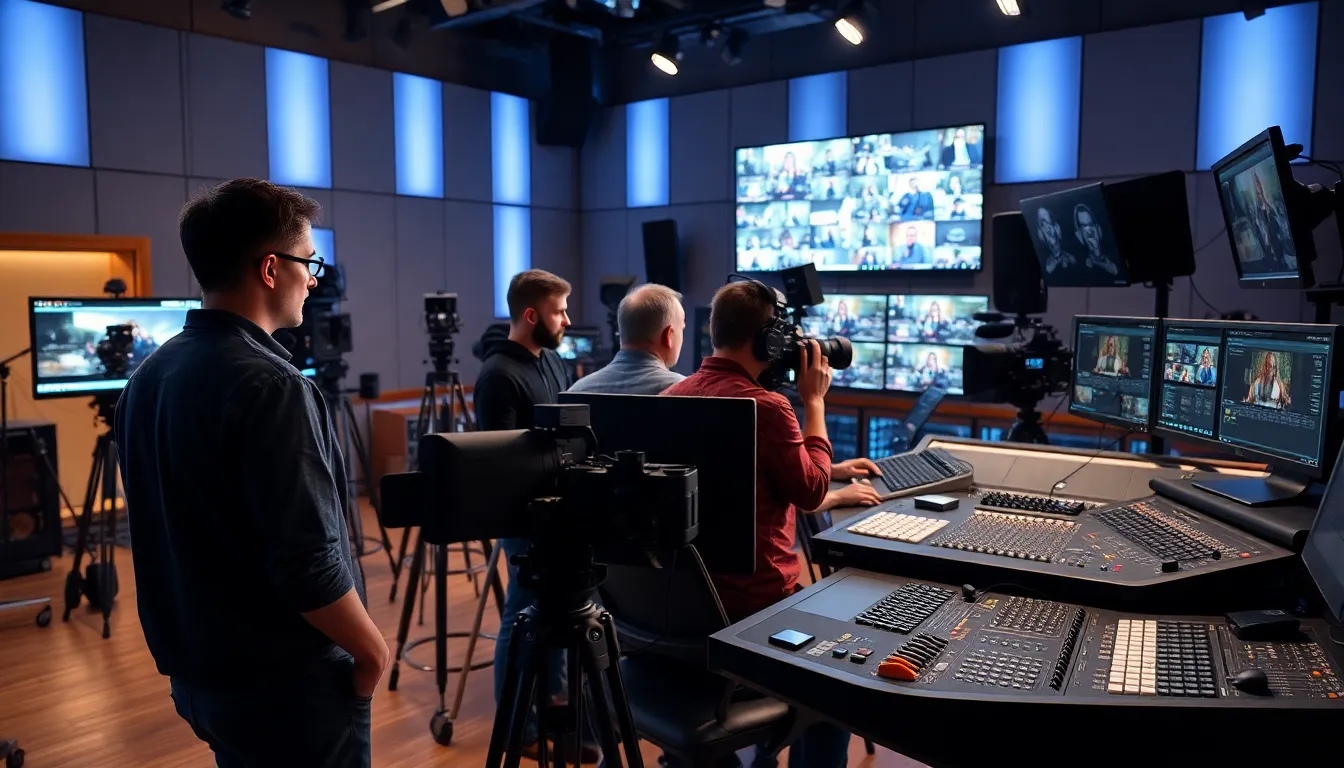In a world where every cat video and viral dance challenge seems to reign supreme, the arts audio/video technology and communications career cluster offers a treasure trove of opportunities. This dynamic field is not just about making things look pretty or sound good; it’s about crafting experiences that captivate audiences and tell compelling stories. From sound engineers to video editors, professionals in this sector are the unsung heroes behind the scenes, transforming ideas into reality.
Imagine waking up every day knowing your job involves creativity and innovation, all while possibly wearing pajamas during those late-night editing sessions. Whether it’s producing the next blockbuster or launching a podcast that’ll have listeners hooked, this career cluster is where passion meets profession. Dive in, and discover how to turn your love for the arts into a fulfilling career that’s as exciting as it is rewarding.
Table of Contents
ToggleOverview of Arts Audio/Video Technology and Communications Career Cluster
The arts audio/video technology and communications career cluster encompasses various fields focused on media production and communication strategies. Careers within this cluster include roles such as sound engineers, video editors, and broadcast technicians. Each role contributes significantly to storytelling and content creation, emphasizing the importance of technical skills and creativity.
Skills required in this cluster typically involve proficiency with equipment and software used for audio and video production. Familiarity with industry-standard tools enhances employability and effectiveness in these roles. Understanding the intricacies of audio mixing and video editing software remains crucial for producing high-quality content.
Job prospects in this career cluster are robust, reflecting the constant demand for multimedia content across various platforms. With the rise of digital communication, opportunities expand in social media, advertising, and online streaming. Many professionals enjoy flexibility in their work environment, often allowing remote work options.
Education pathways for aspiring individuals generally include degrees or certifications in areas such as film production, audio engineering, or graphic design. Many technical schools and community colleges offer programs tailored to meet industry needs. Continuous learning and development remain critical for success in this ever-evolving field.
Professional networks provide crucial support and resources for individuals in the arts audio/video technology and communications sector. Engaging with industry events and online communities can foster valuable connections. Exploring internships or apprenticeships can further enhance practical experience and career readiness.
Key Careers in the Field

Various promising careers exist within the arts audio/video technology and communications cluster. Each role contributes significantly to the production and dissemination of creative content.
Film and Video Editors
Film and video editors shape the final product by carefully selecting and arranging footage. They use industry-standard editing software like Adobe Premiere Pro and Final Cut Pro to enhance storytelling. Attention to detail, creativity, and technical skills are crucial in this role. Editors often work closely with directors, ensuring the vision is accurately captured on screen. The demand for skilled editors continues to rise, fueled by a growing need for video content across platforms. Career pathways typically include a degree in film production or communications, and many editors gain experience through internships that provide valuable hands-on training.
Sound Engineering Technicians
Sound engineering technicians play a vital role in capturing and manipulating audio for various projects. They work with microphones, mixers, and software to ensure high-quality sound production. Expertise in acoustics and audio editing software like Pro Tools is essential. Collaboration with directors and producers enhances the audio landscape of film and television. As multimedia content consumption increases, sound engineering technicians enjoy promising job prospects. Many individuals enter this field by obtaining a degree in audio engineering or a related discipline, while internships offer practical experience that strengthens skills.
Broadcast Technicians
Broadcast technicians ensure seamless transmission of audio and visual content over various media. They maintain and operate equipment like cameras, microphones, and transmission systems in studios. Proficiency in technical troubleshooting and equipment operation is vital for success in this role. Technicians often collaborate with producers to meet broadcasting standards and deadlines. As the demand for live and on-demand content grows, opportunities for broadcast technicians remain strong. Many professionals acquire relevant skills through formal education programs in broadcasting or communications, supplemented by hands-on experience in internships or entry-level positions.
Essential Skills and Qualifications
Skills in the arts audio/video technology and communications career cluster encompass both technical and soft abilities. Mastering these skills enhances opportunities for individuals in this dynamic field.
Technical Skills
Proficiency with industry-standard tools defines success in this field. Understanding audio and video software such as Final Cut Pro or Pro Tools helps in producing high-quality content. Familiarity with operating cameras and audio equipment plays a critical role in various positions. Knowledge of video editing techniques enhances creative output. Troubleshooting technical issues ensures smooth operation during production. Staying updated on emerging technologies is vital, as innovations continuously reshape the landscape. Experience with live production techniques provides an edge, especially in fast-paced environments.
Soft Skills
Collaboration serves as a cornerstone in the arts audio/video industry. Communication abilities foster effective teamwork among diverse professionals. Adaptability helps individuals navigate the changing demands of projects. Attention to detail contributes significantly to the quality of the final product. Problem-solving skills allow for quick resolutions when challenges arise. Creativity drives unique expressions and innovative solutions in project execution. Emotional intelligence supports understanding audience preferences, which can elevate content engagement. Resilience promotes perseverance through the pressures often associated with production timelines.
Education and Training Pathways
Education pathways in the arts audio/video technology and communications career cluster range from formal degree programs to specialized certifications. These pathways equip individuals with essential skills for various roles.
Degree Programs
Many universities offer degree programs in fields like film production, audio engineering, and multimedia communications. A Bachelor’s degree typically covers both practical skills and theoretical insights, preparing graduates for roles such as directors or sound engineers. Community colleges often provide associate degrees or diplomas with a strong emphasis on hands-on experience, making them accessible options for aspiring professionals. Coursework may include topics like digital media production and broadcasting techniques, ensuring students gain relevant expertise in the industry.
Certifications and Workshops
Certifications enhance an individual’s qualifications and signify proficiency in specific software or techniques. Various organizations and industry leaders offer certifications for tools like Adobe Premiere Pro and Avid Pro Tools. Workshops provide opportunities for hands-on learning, allowing participants to practice current trends and technologies in audio and video production. Engaging in these educational programs can increase job readiness and set candidates apart in a competitive job market.
Industry Trends and Future Outlook
The arts audio/video technology and communications sector experiences rapid evolution driven by technological advancements. Streaming services, social media content, and virtual events create significant demand for skilled professionals. Companies increasingly seek versatility in audio and video production, emphasizing the importance of creative storytelling across platforms.
Innovations like augmented reality (AR) and virtual reality (VR) become more prominent, enhancing audience engagement and immersive experiences. These technologies require skilled technicians and creative minds capable of merging art with technology. Emerging trends like interactive video content also indicate a shift towards personalized viewer experiences, prompting the need for professionals adept in customizing media.
Job growth within this field remains robust, with the U.S. Bureau of Labor Statistics projecting an increase in roles such as film and video editors and sound engineering technicians. An estimated 18 percent growth in video editing jobs from 2020 to 2030 reflects the industry’s need for content creators in various formats. Sound engineering roles also see similar demand, driven by new media channels and production methods.
Professional development is crucial, as ongoing education equips individuals with new skills and technologies. Certifications in software and training in new tools enhance employability in a competitive landscape. Industry networking through events, workshops, and internships strengthens connections and opens access to hidden job markets.
Flexibility in job roles continues to characterize the sector, with many professionals engaging in freelance work alongside traditional employment. Collaboration between audio and visual creators fosters innovative projects and diverse opportunities in emerging areas, aligning with the industry’s growth trajectory. Overall, staying ahead in this dynamic field requires adopting new technologies and embracing continual learning.
The arts audio/video technology and communications career cluster offers a vibrant landscape for those passionate about creativity and innovation. With a wealth of opportunities ranging from sound engineering to video editing, individuals can find fulfilling paths that align with their interests. The industry’s growth, driven by the demand for engaging multimedia content, ensures a promising future for skilled professionals.
By mastering essential technical and soft skills, candidates can position themselves for success in this dynamic field. Continuous learning and networking play vital roles in staying ahead of industry trends and enhancing career prospects. Embracing new technologies and creative approaches will empower individuals to thrive in an ever-evolving environment, making this career cluster an exciting choice for aspiring creatives.




